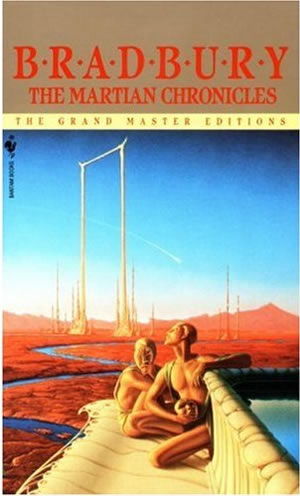 Classic works of science fiction can be timeless for many fans, but they will not always translate well with modern fandom. Issues include implausible science, obsolete predictions or an unfamiliar writing style. I saw some of this when I read The Caves of Steel by Isaac Asimov and Do Androids Dream of Electric Sheep? by Philip K. Dick. It is not that I don’t recommend these books, but instead recommend that potential readers come to it with a specific mindset so that you can understand and appreciate these works. I felt the same way about The Martian Chronicles by Ray Bradbury.
Classic works of science fiction can be timeless for many fans, but they will not always translate well with modern fandom. Issues include implausible science, obsolete predictions or an unfamiliar writing style. I saw some of this when I read The Caves of Steel by Isaac Asimov and Do Androids Dream of Electric Sheep? by Philip K. Dick. It is not that I don’t recommend these books, but instead recommend that potential readers come to it with a specific mindset so that you can understand and appreciate these works. I felt the same way about The Martian Chronicles by Ray Bradbury.
The 1950 short story collection contains tales about human exploration and colonization of Mars beginning in 1999 and ending in 2026. We follow a wide variety of human and martian characters as the first human explorers arrive on Mars, the near extinction of the martians by human disease (paralleling the large loss of life among Native Americans to European disease), the first human colonists to Mars, the abandonment of Mars following nuclear war on Earth and the rebirth of the Martian people. I hope no one is too upset for spoiling much of the plot because, one, this book is over 60 years old and, two, it is mostly background. It is the actual people who stories matter, not the broad sweep of history, in this anthology.
I am not as familiar with Bradbury as I am with other authors, but I did read Fahrenheit 451 (in fact “Usher II” can be seen as an precursor to the novel) many years ago and enjoyed it, so I looked forward to reading this book when I found a copy of it in a used book store in Lake Geneva, WI during a weekend getaway with my wife. Many of the stories were excellent, especially the first few which focused on early interactions between humans and martians. In fact, “The Third Expedition” can almost be classified as horror and tells the story of a crew of human explorers discovering a tiny Midwest town on the Martian plains full of their dearly departed relatives. I know on its face that does not sound frightening, but Bradbury skillfully managed to show how deadly it can be when we let our guard down on an alien world. I also enjoyed the more humorous “The Silent Towns” where the last man on Mars tracks down the last woman on Mars and we witness his disappointment when she does not quite live up to his dreams.
From fear and laughter, Bradbury also conveys sadness especially in the “The Martian” where an elderly couple grieving for their son suddenly find him standing on their doorstep to “There Will Come Soft Rains” where a lonely smart house continues to carry out its routine despite its family being nothing more than shadows burned forever on its walls by nuclear flame. The smart house is just one of many future technologies to appear in the collection including robots, life extension (there is a cast away line about Albert Einstein still being alive in “The Third Expedition”) and, of course, interplanetary travel. The fact that we now live during the events of The Martian Chronicles is an example of the obsolete futures that plague classic SF and sometimes prevent modern readers from enjoying it. Meanwhile many facts are strangely missing from this old future. As mentioned before, there is a nuclear war on Earth, but no mention of the parties involved. Presumably it would be the Soviets as the Cold War was just starting when these stories were first written, but they are absent from the story (you never hear about Soviet missions to Mars) and the aftermath of the nuclear war is similar more to the apocalyptic ideas found in On the Beach, rather thea actual predictions about the loss of human life if nuclear war happened.
I did not enjoy all of the stories in The Martian Chronicles. Some are skip-able and others are overly didactic, especially “—And the Moon Be Still as Bright”. From a historian’s perspective I also had problems enjoying “Way in the Middle of the Air”. The story follows the news that the entire African-American population of the southern United States leaving for Mars and the efforts of one bigot who vainly tries to get them to stay. As a criticism of early 20th century southern society, the story is a moving tale about racial prejudice in America. As a plausible future based on evidence on past historical circumstances, it is a highly unlikely scenario. Consider the American Colonization Society (ACS), an organization of evangelicals and slaveholders, who felt that everyone would be better off if freed slaves would settle in Africa, which would hopefully encourage more slaveholders to free their slaves. The ACS had tacit support from the US government and the fruit of their experiment can still be seen today in the form of the African nation Liberia (whose capital, Monrovia, is named after American president James Monroe).
The ACS, however, found itself opposed by numerous factions including northern abolitionists, who believed removing freed slaves would only strengthen slavery, and southern slaveholders, who saw it as a threat to their economic livelihood. Ironically enough, their fiercest opposition came from African-Americans. They harbored no connection to Africa, having been born in America, and would rather reform their homeland than uproot themselves for another. Nevertheless, the southern 21st century America of The Martian Chronicles is remarkably unchanged from the 1940s-50s south of our history and could explain the mass exodus to Mars, but it can also be written off as another issue involving SF works (and not just the classics) where technology advances, but society remains stagnate.
Of course, this is just my perspective on the collection. In general, I enjoyed reading The Martian Chronicles and appreciated the many moments it allowed for introspection. I warn people who are more experienced with contemporary SF, however, to keep in mind when these stories were written so you do not become overly critical of the novel and can enjoy the message Bradbury was trying to get across. I feel The Martian Chronicles will continue to attract our curiosity just as the red orb it was inspired by continues to attract those few dreamers still reaching for the stars.











Recent Comments